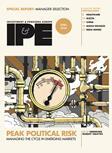The newly published EU draft directive on supplementary pensions for mobile workers has omitted controversial measures on vesting periods and transfer of rights in a bid to achieve consensus amongst member states.
The draft, published by the European Commission last month, takes a multinational rather than transnational approach. Geoffrey Furlonger of Mercers European office in Brussels says: It concentrates on preserving existing rights, on making sure there is no discrimination over existing rights to benefits. States are meant to treat contributions to a registered scheme from one country exactly the same as they would in their own country."
Assessing the merits of the draft, he says: "It is a modest draft and quite a good one. It does not attempt to al-low an individual to preserve their existing rights in a new scheme or transfer their rights into it. That seems to have been ruled out which is pretty sensible because few countries would have accepted it."
The EFRP has welcomed publication of the draft directive but will consult with its members before it provides a detailed response.
The directive is largely the work of Social Affairs Commissioner Padraig Flynn and DGV, with some input from Mario Monti's DGXV.
Key measures include the preservation of acquired rights, when a worker moves to an employer elsewhere in the EU, the guarantee of cross-border pay-ments, and measures to allow workers temporarily posted to another state to continue to pay contributions to the scheme in their member state of origin.
The directive incorporates some of the thinking of the Veil report published late last year, which concluded that legislative action was required because the risk of losing supplementary pension rights faced by 3m mo-bile EU citizens posed a serious obstacle to free movement of workers with-in the free market.
The current directive, even in its conciliatory form still faces substantial obstacles before it becomes EU law as there are still some tax issues to be re-solved. As it requires unanimity to pass, it could still fall foul of any one member's insistence that subsidiarity must apply.
The commission has also been criticised because the supplementary pensions green paper, published earlier this year, covers some of the same ground by canvassing views on the subject of mobility. Now, before the consultation period is over, draft legislation has been produced. The confusion occurs because legislation in this area is very much a joint production between the two directorates V and XV and there has been some speculation about 'turf wars' within the commission itself.
John Lappin"












No comments yet